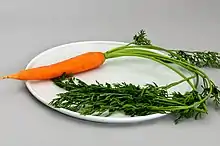Carrot
The carrot (pronounced CARE-ot) is a type of plant. Many different types exist. The Latin name of the plant is usually given as Daucus carota. The plant has an edible, orange root, and usually white flowers. Wild carrots grow naturally in Eurasia. Domesticated carrots are grown for food in many parts of the world.
| Carrot | |
|---|---|
 | |
| Scientific classification | |
| Kingdom: | Plantae |
| Clade: | Tracheophytes |
| Clade: | Angiosperms |
| Clade: | Eudicots |
| Clade: | Asterids |
| Order: | Apiales |
| Family: | Apiaceae |
| Genus: | Daucus |
| Species: | |
| Subspecies: | D. c. subsp. sativus |
| Trinomial name | |
| Daucus carota subsp. sativus (Hoffm.) Schübl. & G. Martens | |
Carrots are grown in the ground, and carrots roots are a common edible vegetable. After cleaning, the roots may be eaten raw or cooked. They are served as part of many dishes. In Portugal, carrot jam is a speciality.
Images
 Raw carrots
Raw carrots Carrots can come in different colors
Carrots can come in different colors What they look like before being used for cooking.
What they look like before being used for cooking.
Nutrition
Carrots are a moderate source of beta carotene, biotin, vitamin K1, vitamin B6, and potassium. Along with beta-carotene, carrots also have carotenoids another antioxidant helpful to enhance immunity functions and decreased risk of cardiovascular diseases, degenerative diseases and different types of cancers[1]